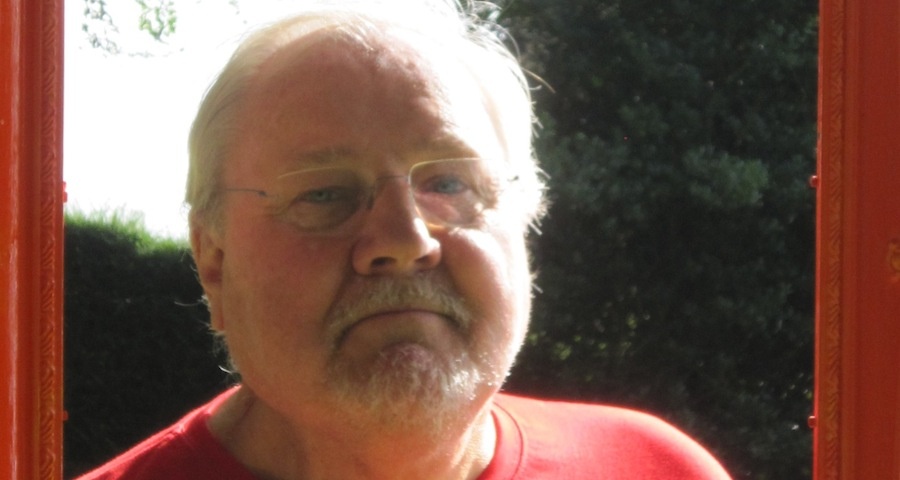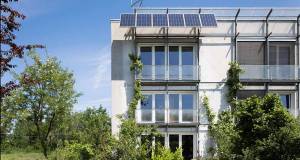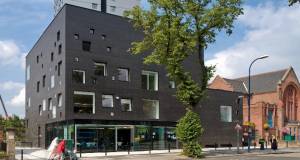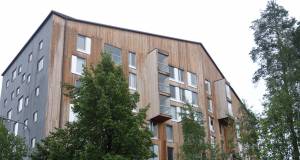
- Blogs
- Posted
A tribute to eco-architect Howard Liddell
In this moving tribute, Paul Leech of Gaia Ecotecture pays tribute to leading ecological architect Howard Liddell, who passed away last week.
Since I first met him, at his then place in Aberfeldy, almost a quarter century ago, (and even up until very recently on email banter, back and forth from Dublin), I have always found Howard Liddell a welcome, dialectical, ‘alpha’ character.
Being a bit of a creative iconoclast myself, from my teens, we often found ourselves bristling, even lately, with various ideas and impulses and the synthesis was usually a flint spark worth having – a light in the darkness, against the apathy and acquiescence to what we both, and all our dear colleagues in Gaia International, saw as a clear and present danger to human habitat.
Now he is gone and humankind has only one more body-change, of seven years left (Sweeney, IPCC 2013), or two more elected democratic governments, to enact policies and instruments before climate change and mass species extinction (currently one every ten minutes) are beyond our human control. Gaia would do fine, but would we?
Tragically, Howard will not get one more body change in this incarnation. For myself, I have had nine times seven so far, and will be lucky to get one more. In living that remaining time, Howard will live on in me, as in so many others, as an incandescent catalytic soul, a magnesium taper, burning with indignation at the self-destructive hubris of humankind, and of ‘archi'-tects, in particular.
His gimlet eye and respect for Occam’s Razor is essential to act as a corrective to herd mentality, crazes, and swarm dynamics, whether for passive this-or-that or whatever techie 'boys-toys', to keep on a course of his beloved ‘eco minimalism’, grounded in holistic common sense. He appreciated the quantitative ecological parameters of passive house technique, but saw it as a necessary, but insufficient, criterion of good design; just like good structural design (eg that of the late Peter Rice) brings an elegant economy, fitness, in the deepest sense, not an end in itself, but a means to a greater end; the ‘itchy underwear’ of ‘tick-boxing’ and 'points-harvesting' was never Howard’s way to holism — ecotecture is profoundly transformative: passive house helps, but is incomplete.
DGNB (from the German Sustainable Building Council, replacing BREEAM and LEED) comes much closer to an holistic assessment tool, invoking much more comprehensive criteria. As Christopher Alexander taught himself, and us, in the 1960s and 1970s (in Notes on the Synthesis of Form) you cannot get to good design by tick-boxing, but all tools are welcome.
Something in Howard never aged, never ‘grew up’, (thank Gaia!) into the staid ‘adulthood of acceptance’ he was forever the irrepressible red-faced blonde-haired schoolboy, the brightest chap in the class, bursting with ideas, mischief and energy, ‘ripping yarns’ in the breathy voice of the enthusiast, refusing, and creatively subverting erroneous ‘authority’ (his success with eco-city workshops for school children was truly outstanding).
His OBE was ‘just in time’ to show him that he was, after all, deeply appreciated by his own nation, which now mourns the passing of such a great, bright, warm, guy, larger than this life, in so many wonderful ways. I am so glad he knew of that OBE honour in time.
He leaves such a void in his wake in Gaia’s ecosphere, but not without trace of spirit, insight, high intelligence and humour. Whatever your metaphysics are, my profound sense is that Howard will not disappear, but will just change utterly and linger in the ether in the indomitable hope and expectation that, despite the highly justifiable ‘doomers’, humankind can, just about, turn this around in time – can make the step-changes to a chain-reaction of hope and resurgence, a gaiametric progression of transformation. I only hope that democratic society comes to that insight ,before it really would be catastrophically too late for our species.
I have no words for his sorrowing wife Sandy, except to express the hope that she will recover from her grief enough over time, to carry on the work they so energetically, and elegantly (in the scientific and aesthetic sense), advanced so very far, together.
The second editon of Howard Liddell's book Eco-minimalism: the antidote to eco-bling has just been published.







